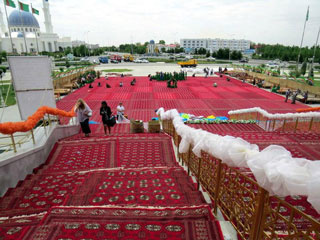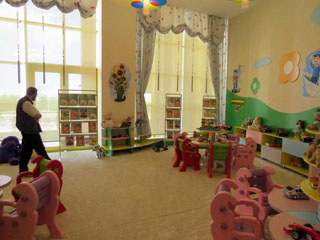
Campus Voices is a place for faculty, staff and students to share ideas, views and information about issues that matter to them personally and professionally. The opinions expressed here do not necessarily represent those of the University of Iowa. View more Campus Voices here.
Scores of hand-woven carpets were laid across the plaza—a sea of red surging over the steps to the library in Mary. A Turkmen drill team, in white uniforms fringed with green, paraded on the sidewalk in preparation for National Carpet Day. The plastic sheeting stretched across the steps forced us to pick our way up the granite siding to the entrance. The poets and librarians assembled in the conference room had been waiting for nearly an hour by the time we took our seats.
Our literary delegation—poet and memoirist Steven Kuusisto, novelist Ann Hood, fiction writer Chinelo Okparanta, and me—had spent the morning touring the ruins of Merv, the capital of an ancient civilization, and now our cultural diplomacy mission to Turkmenistan continued with speeches which seemed to bear the same relation to fact as the Nestorian tradition in Mary that the mother of Jesus is buried here. (The name of the city is likely a corruption of Merv.)
For example, one poet said that his countrymen had read deeply in American literature, and rattled off the names of our major writers: Jack London, Mayne Reid, Johanna Lindsey. My fellow writers and I looked at one another, puzzled. I explained to our hosts that Martin Eden was not central to the American literary imagination; that The Headless Horseman was not the most important book to emerge from the Civil War; and that we had no idea who Johanna Lindsey was.
The poet was aghast. She has sold millions of novels, he explained. Who could guess that in the heart of the Karakum Desert we would be introduced to a romance writer from our own country? Such is the beauty of cultural diplomacy: we learn strange truths; dispel stereotypes and correct misimpressions; meet one another on common ground, this time in a library.
In the corner was a small exhibit of American books—and a larger one of the president’s selected writings, To New Heights of Progress, hundreds of copies of which were on display in the rooms we toured after our meeting, along with an occasional guide to the medicinal uses of plants in Turkmenistan.
The director took us to the observatory on the top floor, which opened like a giant steel flower onto such brilliant sunlight that I had to shield my eyes. Omar Khayyám, the eleventh-century mathematician, astronomer, and poet (high school students used to learn by heart quatrains from Edmund Fitzgerald’s translation of his Rubaiyat), built an observatory in Merv, and the authorities hope that the installation of an expensive German-built telescope will revive that intellectual tradition. But we saw no evidence that it was ever used.

Nor did we meet any patrons—only room after empty room: a café without table settings, a room for the elderly with Korans open on reading stands, and, most haunting of all, a children’s playroom, with toys and tables and games arranged, it seemed, for no one. It was a library without books (except for the president’s tome) or readers.
The last room before the exit was crowded, though, and the prospect of finding readers made us giddy until we saw that everyone was facing in the same direction, listening to someone give instructions: the drill team was taking a break before the state news service filmed their parade.
The footage would air the next day, as if in real time: censors had to approve the report before it was broadcast.
No sense in taking chances: not long before, the president had fallen off his horse in a race, pitching headfirst into the track, and while no footage of his mishap appeared on Turkmen television, and indeed the authorities checked the spectators’ cameras and phones, a video of his fall went viral—except in Turkmenistan.
But everyone knew what happened.
Christopher Merrill, director of the UI International Writing Program, traveled with fellow writers to Turkmenistan in May on an IWP reading tour. Organized each spring in partnership with the Bureau of Educational and Cultural Affairs at the U.S. Department of State, the tours are designed to introduce American writers to a country or region with a relatively sparse history of literary liaisons with the United States and strengthen ties between creative communities.Turkmenistan hosts only 7,000 tourists a year, making it one of the world’s least visited places (behind even Afghanistan and North Korea).